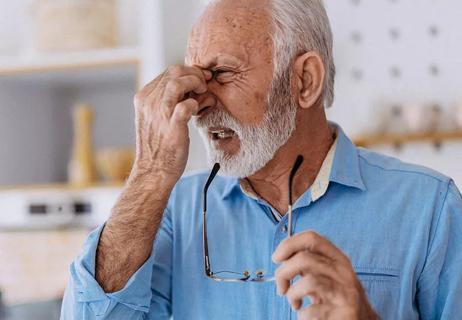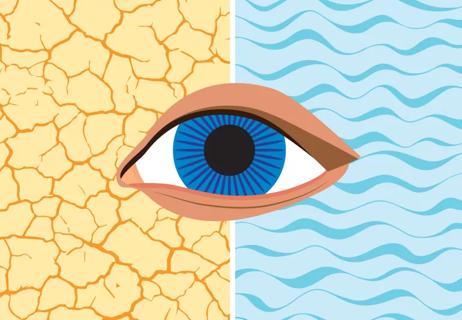A low-vision evaluation can help identify your best options

Living with wet age-related macular degeneration can change things. If you’re experiencing blurred vision or dark spots in your vision, treatments may help stabilize or even restore your sight.
Advertisement
Cleveland Clinic is a non-profit academic medical center. Advertising on our site helps support our mission. We do not endorse non-Cleveland Clinic products or services. Policy
But it can still be scary, to think about a condition that can rob you of your sight, your independence, your way of life.
There may be comfort in knowing that, no matter how advanced, wet age-related macular degeneration won’t leave you completely in the dark, says ophthalmologist and retina specialist Aleksandra Rachitskaya, MD.
Wet age-related macular degeneration, or wet AMD, and geographic atrophy can severely affect your central vision, which is your ability to see things in front of you. But it doesn’t affect your peripheral vision — the things you see side-to-side or up-and-down without moving your head.
“Even people who have the most advanced forms of age-related macular degeneration retain enough peripheral vision to see when there’s a person in front of them, for example. They may not be able to see the details of the person’s face, but they’ll see there’s someone there,” Dr. Rachitskaya explains.
If you’re experiencing vision loss from wet age-related macular degeneration, some practical changes can help you make the most of the vision you do have.
Here, Dr. Rachitskaya suggests some modifications that can help you maintain a level of independence and manage your day-to-day tasks.
Advertisement
Dr. Rachitskaya recommends anyone with significant vision loss to get a low-vision evaluation by a trained eye care specialist. During that appointment, a professional will test your vision and get to know more about the specific ways your vision is affecting your life. They can help you understand the best modifications for you and your life.
“Low-vision evaluations can help you learn to perform the activities of daily living that become more difficult with advanced disease,” Dr. Rachitskaya says.
During those conversations, your provider may recommend things like vision assistive devices, technological aids and thoughtful home modification techniques to improve your quality of life.
In addition to regular vision screenings to adjust your prescription, many people with vision loss often benefit from additional visual aid devices for activities like reading and looking at screens. That may include devices like:
Much of your life is likely online these days. And navigating a computer or smartphone screens with vision loss can be a challenge.
Your phone or computer may already have built-in screen-reading software that can keep you connected to the digital world. Screen readers can read your text messages, emails and other online communications out loud. They can be an important tool to navigate websites and help you go about your online life — keeping up with friends and family on social media, shopping online, paying bills and other tasks that help keep you connected with others and manage your life.
Safety is one of the top concerns associated with vision loss. And while you can’t always control the world, you can make some modifications in your home that can help you get around safely and efficiently.
Dr. Rachitskaya suggests taking stock of your home and making some vision-friendly changes, like:
Living with a vision condition like wet AMD can feel scary, isolating and burdensome. Having lowered vision can mean relying on other people for tasks you used to do for yourself, like driving or cleaning your house. It can be frustrating, even depression-inducing.
“There are higher levels of depression among people who have vision loss, and that’s understandable” Dr. Rachitskaya shares. “Learning to live with limited vision takes work to get used to, not only physically but socially and emotionally as well. There are many recourses available.”
Advertisement
Talk with your healthcare team about any troubles you have adjusting to the realities of living with vision loss from wet age-related macular degeneration. A trained mental healthcare provider may be able to help.
Continue seeing your eye health specialist regularly and managing other health issues, too, to continue living your best life possible.
Advertisement
Learn more about our editorial process.
Advertisement

Having a first-degree biological relative with this eye condition raises your risk, but other factors are at play, too

Eating a balanced diet can help protect your eyes and may prevent AMD from progressing

They may help, but it depends on factors like the stage of your disease

A decrease in visual signals to your brain can lead to seeing things that aren’t really there

A loss of central vision might complicate things behind the wheel

Wet age-related macular degeneration is rarer and always advanced

A correct prescription helps your eyes see clearly — but as natural changes occur, you may need stronger or different eyeglasses

The differences are few, but ophthalmologists can perform eye surgeries and more complex procedures

Wearing a scarf, adjusting your outdoor activities and following your asthma treatment plan can help limit breathing problems

Your diet in the weeks, days and hours ahead of your race can power you to the finish line

When someone guilt trips you, they’re using emotionally manipulative behavior to try to get you to act a certain way